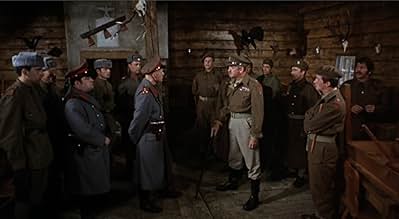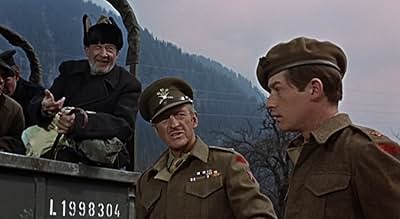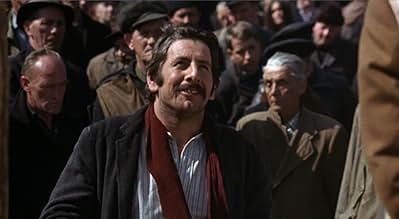After World War II, in an Austrian camp for displaced people, an interpreter mediates between the British and the Soviets regarding the fate of various refugees.After World War II, in an Austrian camp for displaced people, an interpreter mediates between the British and the Soviets regarding the fate of various refugees.After World War II, in an Austrian camp for displaced people, an interpreter mediates between the British and the Soviets regarding the fate of various refugees.
Hana Maria Pravda
- Beata
- (as Hana-Maria Pravda)
- Director
- Writers
- All cast & crew
- Production, box office & more at IMDbPro
Featured reviews
When the film was released, Columbia booked it as a 2nd feature. Personally, after trying to sit through it, the studio probably should have shelved it, not necessarily for content, but because that use of flashy zooms became so difficult to sit through that I headed for the lobby more than four times.
In this instance zoom meant zooming in - cut - zoom out - zoom in-cut-zoom out all the way through the film.
The use of zoom lenses in motion pictures was a new tool for filmmakers at the time, but its application here made the film impossible to sit through, at least in a theatre. Until now, thought it had all but disappeared forever.
Not sure if time has changed any of this.
In this instance zoom meant zooming in - cut - zoom out - zoom in-cut-zoom out all the way through the film.
The use of zoom lenses in motion pictures was a new tool for filmmakers at the time, but its application here made the film impossible to sit through, at least in a theatre. Until now, thought it had all but disappeared forever.
Not sure if time has changed any of this.
This film is set in post WWII occupied Austria that is split into zones run by the French, British, American and Russians respectively. Millions of people are displaced and refugee camps are formed in places like Austria to distribute refugees to places in this film like Linz and the West or Freistadt and eventually Russia.
It has elements of light comedy as the by the book British Major Burnside (David Niven) forbids 'fraternization' as he calls it but everybody seems to end up naked and frolicking in bed. Was I watching a Carry On film! Several border disputes with the Russians also provide more comic scenes including a border line that separates an alm establishment! The plight of the refugees has a more serious tone to proceedings.
Chaim Topol plays a character called Janovic, one such refugee but with a special 'talent' of interpreting several languages that proves useful to Burnside in dealing with the Russians in border disputes and such like. Topol steals the film for me with his comic touch and serious acting in other scenes.
Eventually it is revealed that Janovic is a deserter from the Russian army and to avoid a dispute with the allied (at the time) Russians is ordered to be returned to them, and probable death. Hardly comedic and that's one of the serious strands and very tragic ones.
Another serious strand is the story of Major Burnside during the War and the reason he has been placed at such outposts as this and later it transpires Indonesia.
A solid cast featuring the likes of David Niven, Topol, a young John Hurt, Anthony Quayle. Not a bad list and the film probably deserves greater recognition.
It has elements of light comedy as the by the book British Major Burnside (David Niven) forbids 'fraternization' as he calls it but everybody seems to end up naked and frolicking in bed. Was I watching a Carry On film! Several border disputes with the Russians also provide more comic scenes including a border line that separates an alm establishment! The plight of the refugees has a more serious tone to proceedings.
Chaim Topol plays a character called Janovic, one such refugee but with a special 'talent' of interpreting several languages that proves useful to Burnside in dealing with the Russians in border disputes and such like. Topol steals the film for me with his comic touch and serious acting in other scenes.
Eventually it is revealed that Janovic is a deserter from the Russian army and to avoid a dispute with the allied (at the time) Russians is ordered to be returned to them, and probable death. Hardly comedic and that's one of the serious strands and very tragic ones.
Another serious strand is the story of Major Burnside during the War and the reason he has been placed at such outposts as this and later it transpires Indonesia.
A solid cast featuring the likes of David Niven, Topol, a young John Hurt, Anthony Quayle. Not a bad list and the film probably deserves greater recognition.
David Niven makes a very remarkable performance here as an unwilling soldier in charge of a refugee camp (in the times of 4 million displaced persons in Europe) in Austria, where he has to send many paperless refugees into the Russian zone, where they have nothing good to expect in the days of big brother Stalin. He has a sore past that aches, but as a major in charge he has to stick to his stiff uppper lip, no matter what difficult trials he has to go through again. Topol makes a brilliant performance as the multí-lingual interpreter with many tricks up his sleeve, born in a cart between Tiflis and Tashkent, and he makes the best of it and is thoroughly entertaining, until the bleak reality of no peace after a war sets in, This is really a tragedy of several deep bottoms, and although David Niven is already thoroughly disíllusioned and Topol already is acquainted with the worst and has learned the hard way to survive, John Hurt as the young greenhorn still has his disillusions ahead of him, and they will strike him hard. Fortunately there is Anna Karina for a well needed sort of comfort to all of them.
The film is more serious than it seems, it tries to appear like a comedy, and there certainly are comic ingredients, but the comic gloss cannot hide or smooth over the cruelty of the reality.
Although the dark side of the Stalin regime should have been universally known to the world already after the Stalin trials of 1936, the west was amazingly naïve about Stalin and the true nature of his "communist paradise", as Roosevelt allowed himself to be duped by him and Churchill actually believed in him - until the cold war was a blatant fact, some time after the peace of the second world war, which never really ended but only took on less obvious inhuman activities of darkness.
After watching Before Winter Comes I'm still trying to figure out the points it was trying to make and where was the humor. Such laughs it had are the grimly ironical kind. As a vehicle for Topol it was quite good for that.
David Niven was playing it serious for once. He plays a British army major who for trying a grandstand play during battle got a whole lot of soldiers killed. Now that World War II is over he's in charge of a displaced refugee camp. Under the strict guidelines set by Yalta he has some rigid instructions as to where to send refugees. No one wants to go to the Russian zone, but that's not his call.
As for Topol when the call goes out for camp interpreter Topol is ready to make himself useful. In fact he's almost too good to be true. Probably he is.
In this film that seems rather pointless Topol is the whole show. A bit of his Tevye from Fiddler On The Roof is here, but his character is more like something Danny Kaye might have done. The script doesn't help Topol, he has to mine some barren land for some laughs.
Niven is not his usual charming self trying to carry a film on that. His character doesn't permit charm. He's in a situation he hates and wants to go back to 'fighting' regiment. But that says Brigadier Anthony Quayle ain't about to happen.
As a vehicle for Topol he proves he can play something other than Tevye, like Yul Brynner being someone other than the King of Siam. But the film really sinks into a bog of pretension in the final analysis.
David Niven was playing it serious for once. He plays a British army major who for trying a grandstand play during battle got a whole lot of soldiers killed. Now that World War II is over he's in charge of a displaced refugee camp. Under the strict guidelines set by Yalta he has some rigid instructions as to where to send refugees. No one wants to go to the Russian zone, but that's not his call.
As for Topol when the call goes out for camp interpreter Topol is ready to make himself useful. In fact he's almost too good to be true. Probably he is.
In this film that seems rather pointless Topol is the whole show. A bit of his Tevye from Fiddler On The Roof is here, but his character is more like something Danny Kaye might have done. The script doesn't help Topol, he has to mine some barren land for some laughs.
Niven is not his usual charming self trying to carry a film on that. His character doesn't permit charm. He's in a situation he hates and wants to go back to 'fighting' regiment. But that says Brigadier Anthony Quayle ain't about to happen.
As a vehicle for Topol he proves he can play something other than Tevye, like Yul Brynner being someone other than the King of Siam. But the film really sinks into a bog of pretension in the final analysis.
This starts out as a rather tongue-in-cheek rendering of life in a camp for displaced persons after the war in 1945 somewhere near the Austrian border. There are many humorous incidents but eventually the film's message does get serious later on.
I'm amazed at the abundance of illustrious actors making up the cast -- David Niven as Major Burnside; Topol as the effusive interpreter; John Hurt playing the youthful but intense Lieutenant Pilkington; and Anthony Quayle as Brigadier Bewley.
There are moments of deep friction in the camp between British and Russian troops on various zoning matters including the fate of the interpreter who happens to be Russian.
Although there is a fair amount of drama and mature content throughout, I have the impression that this film has been an easy interlude for all these great, serious actors. Anna Karina as Maria the local girl is a lovely addition to the cast.
The scenery is fabulous of course, being filmed on location in Austria. It is somewhat of an offbeat script, however it does hold one's attention through to the end. This movie is one I missed out on all these years so am glad to have had to opportunity to finally see it. For me such good actors can't help but create an absorbing drama.
I'm amazed at the abundance of illustrious actors making up the cast -- David Niven as Major Burnside; Topol as the effusive interpreter; John Hurt playing the youthful but intense Lieutenant Pilkington; and Anthony Quayle as Brigadier Bewley.
There are moments of deep friction in the camp between British and Russian troops on various zoning matters including the fate of the interpreter who happens to be Russian.
Although there is a fair amount of drama and mature content throughout, I have the impression that this film has been an easy interlude for all these great, serious actors. Anna Karina as Maria the local girl is a lovely addition to the cast.
The scenery is fabulous of course, being filmed on location in Austria. It is somewhat of an offbeat script, however it does hold one's attention through to the end. This movie is one I missed out on all these years so am glad to have had to opportunity to finally see it. For me such good actors can't help but create an absorbing drama.
Did you know
- TriviaAlysoun Austin's feature-film debut, playing the role of "A.T.S. Driver."
- GoofsThe John Hurt character (Lieutenant Pilkington) has long hair, like John Lennon, not in keeping with British army regulations.
- Quotes
Major Burnside: What languages do you speak?
Janovic: Russian, Polish, Greek, Hungarian, German, Romanian, Bulgar, Serbo-Croat, Romani, Italian, some Arabic, some Yiddish, a little Chinese.
- Crazy creditsOpening credits prologue: OCCUPIED AUSTRIA SPRING, 1945
- How long is Before Winter Comes?Powered by Alexa
Details
- Runtime
- 1h 43m(103 min)
- Aspect ratio
- 1.85 : 1
Contribute to this page
Suggest an edit or add missing content






































